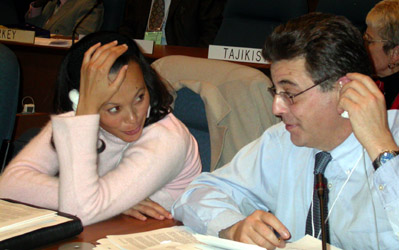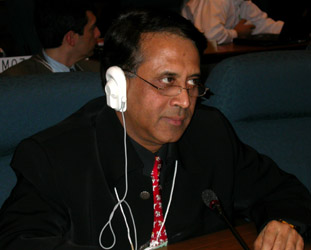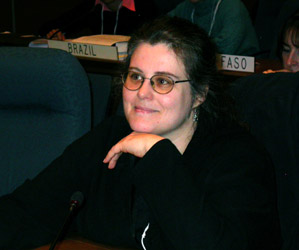|

|
ENB
web
coverage
and
daily reports
|
|
Day
|
HTML
|
PDF*
|
TXT
|
|
|
 |
 |
 |
|
|
 |
 |
 |
|
3
December |
 |
 |
 |
|
4
December |
 |
 |
 |
|
5
December |
 |
 |
 |
|
SUMMARY |
 |
 |
 |
|
|

|
|
 To
view PDF files, you will need the free Adobe Reader To
view PDF files, you will need the free Adobe Reader
|
 To
listen to Real Audio files, you will need the free
RealOne Player To
listen to Real Audio files, you will need the free
RealOne Player |
|
SECOND AD HOC OPEN-ENDED WORKING GROUP ON
ACCESS AND BENEFIT-SHARING
Montreal,
Canada; 1-5 December 2003
Highlights for Tuesday,
2 December 2003
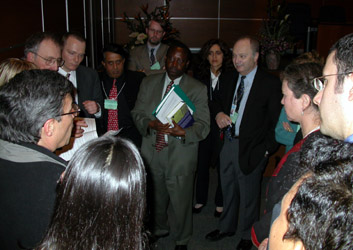 Delegates
to the second meeting of the Ad Hoc Open-ended Working Group on
Access and Benefit-sharing of the Convention on Biological Diversity (CBD)
met in sub-working groups throughout the day. Sub-Working Group I (SWG-I)
heard reports on experience with the Bonn Guidelines, and considered the use
of terms and other approaches. Sub-Working Group II (SWG-II) addressed
measures to ensure compliance with prior informed consent (PIC) and mutually
agreed terms (MAT), including the role of intellectual property rights (IPRs),
and capacity building for ABS. A brief Plenary met in late afternoon to
review progress. Delegates
to the second meeting of the Ad Hoc Open-ended Working Group on
Access and Benefit-sharing of the Convention on Biological Diversity (CBD)
met in sub-working groups throughout the day. Sub-Working Group I (SWG-I)
heard reports on experience with the Bonn Guidelines, and considered the use
of terms and other approaches. Sub-Working Group II (SWG-II) addressed
measures to ensure compliance with prior informed consent (PIC) and mutually
agreed terms (MAT), including the role of intellectual property rights (IPRs),
and capacity building for ABS. A brief Plenary met in late afternoon to
review progress.
Above photo: Delegates seeking guidance on how to proceed on a Chair's
text on capacity building.
|
|
|
|
| SUB-WORKING
GROUP I: REPORTS
|
|
|
 |
|

Ireland
said it will undertake a review addressing the state of, and
access to, genetic resources in Ireland
as well as foreign genetic resources utilized by
non-governmental bodies operating within the jurisdiction of
Ireland.
Above photo: Matthew Jebb (Ireland)
|
|
|
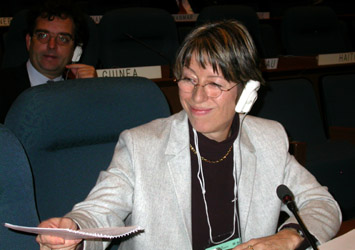 |
|

Germany
highlighted its ABS-related activities and, noting the complexity
of ABS issues, stressed the need to explain the content of the
Bonn Guidelines. Above photo: Almuth Ostermeyer-Schlöder
(Germany)
|
|
|
|
South
Africa said its upcoming biodiversity legislation will provide for
export permits for genetic resources. Above photo L-R: Annastache
Brown (South Africa) in discussion with Enrique Alonso
(Spain)
|
|
|

|
|

Denmark noted the
Greenlandic Home Rule Authority's new proposal for an ABS regime
in line with the Bonn Guidelines. Above photo: Christian Prip
(Denmark)
|
|
|
|
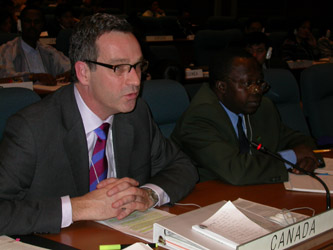 |
|

Canada
noted its progress report on its use of the Bonn Guidelines,
highlighting, inter alia, the need to increase industry
awareness of national access laws, the particularity of countries
that are both users and providers, and the potential for learning
from other countries' experiences. Above photo: Timothy
Hodges (Canada)
|
|
|
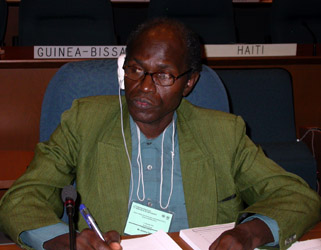 |
|

The
Gambia cited extensive use of the Bonn Guidelines by a
multi-stakeholder working group currently elaborating its national
ABS legislation. Above photo: Almamy Camara (the Gambia)
|
|
|
|
USE OF TERMS:
|
|
|
Antigua
and Barbuda emphasized difficulties faced in particular by Caribbean
countries in gaining electronic access. Above photo: Diann
Black-Layne (Antigua and Barbuda)
|
|
|
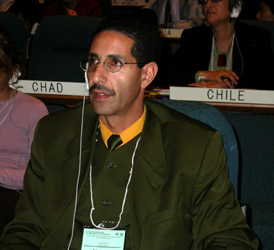
|
|
Algeria
suggested revisiting the definition issue once the international
ABS regime is in place. Above photo: Boumediene Mahi
(Algeria)
|
|
|
|
OTHER
APPROACHES:
|
|
|
The
Secretariat introduced its overview of other approaches to complement the
Bonn Guidelines and assist countries in ABS implementation (UNEP/CBD/WG-ABS/2/2
Section III).
|
|
|
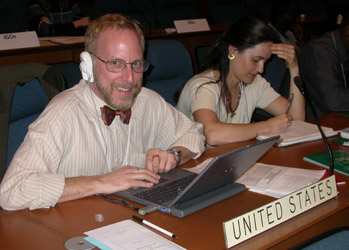 |
|
Acknowledging
the merits of certificates, the US warned against increased costs
and delays. Above photo: Leonard Hirsch (US)
|
|
|
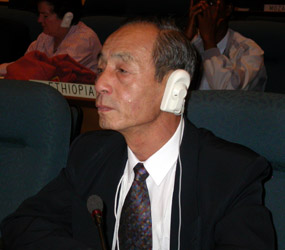 |
|
China suggested
the CBD Secretariat provide a further compilation of existing
arrangements and approaches.
Above photo: Cheng
Weixue (China)
|
|
|
| SUB-WORKING
GROUP II: COMPLIANCE
MEASURES FOR PIC AND MAT
|
|
|
|
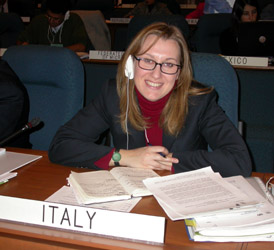 |
|
ITALY,
on behalf of the EC member states and acceding countries (EU),
described EU measures on: a network of ABS focal points; corporate
social responsibility; consideration of disclosure of origin in
patent legislation; and discussions on a self-standing disclosure
requirement. Above photo: Silvia Francescon (Italy)
|
|
|
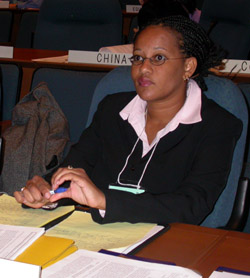
|
|
Barbados
said CITES import/export regulations can be used as a model to
address ABS requirements when national legislation is not yet in
place. Above photo: Kim Downes (Barbados)
|
|
|
|
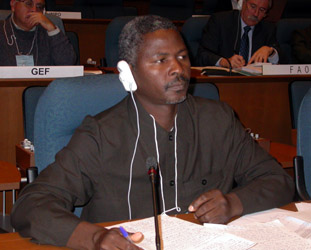 |
|
Niger
called for support in understanding and implementing the Bonn
Guidelines, and stressed the need to assess their applicability
and associated costs in developing countries. Above photo: Boukar
Attari (Niger)
|
|
|
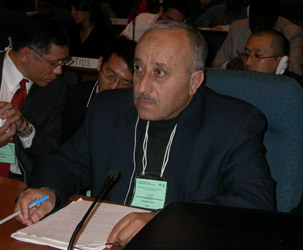 |
|
Jordan
highlighted the importance of cooperation agreements between users
and providers. Above photo: Abdalla Salman (Jordan)
|
|
|
|
| Intellectual
Property Rights: |
|
|
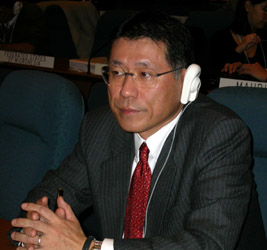 |
|
Japan
supported defensive protection of genetic resources and
traditional knowledge through the IGC's activities on a database
and toolkit for use by patent examiners. Above photo: Hitoshi
Watanabe (Japan)
|
|
|
 |
|
Switzerland
suggested amending WIPO's Patent Cooperation Treaty. Above
photo: Marie Wollheim (Switzerland)
|
|
|
| CAPACITY
BUILDING:
|
|
|
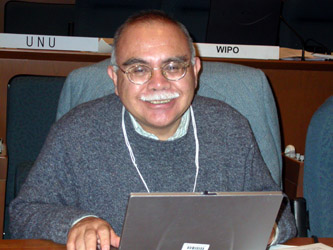 |
|
The
Global Environment Facility (GEF) emphasized that funding will be
made available, noting that reference to GEF in the draft action
plan goes beyond agreed cooperation with the CBD. Above photo:
Mario Ramos (GEF)
|
|
|
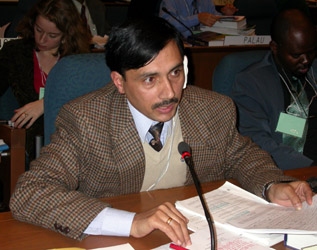 |
|
Nepal
stressed a shared financial mechanism. Above photo: Krishna
Chandra Paudel (Nepal)
|
|
|
|
PLENARY:
|
|
|
|
|
|
|
|
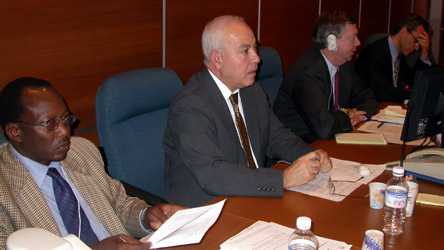
Left photo L-R: Nehemiah
Rotich, UNEP, Hamdallah Zedan, CBD Executive Secretary, Hans
Hoogeveen, CBD
COP President, and Olivier Jalbert, CBD Secretariat. Working
Group Chair Hans Hoogeveen (the Netherlands) presented a
Chair's text on an international ABS regime. |
|
|
|
|
|
 Delegates
to the second meeting of the Ad Hoc Open-ended Working Group on
Access and Benefit-sharing of the Convention on Biological Diversity (CBD)
met in sub-working groups throughout the day. Sub-Working Group I (SWG-I)
heard reports on experience with the Bonn Guidelines, and considered the use
of terms and other approaches. Sub-Working Group II (SWG-II) addressed
measures to ensure compliance with prior informed consent (PIC) and mutually
agreed terms (MAT), including the role of intellectual property rights (IPRs),
and capacity building for ABS. A brief Plenary met in late afternoon to
review progress.
Delegates
to the second meeting of the Ad Hoc Open-ended Working Group on
Access and Benefit-sharing of the Convention on Biological Diversity (CBD)
met in sub-working groups throughout the day. Sub-Working Group I (SWG-I)
heard reports on experience with the Bonn Guidelines, and considered the use
of terms and other approaches. Sub-Working Group II (SWG-II) addressed
measures to ensure compliance with prior informed consent (PIC) and mutually
agreed terms (MAT), including the role of intellectual property rights (IPRs),
and capacity building for ABS. A brief Plenary met in late afternoon to
review progress.



